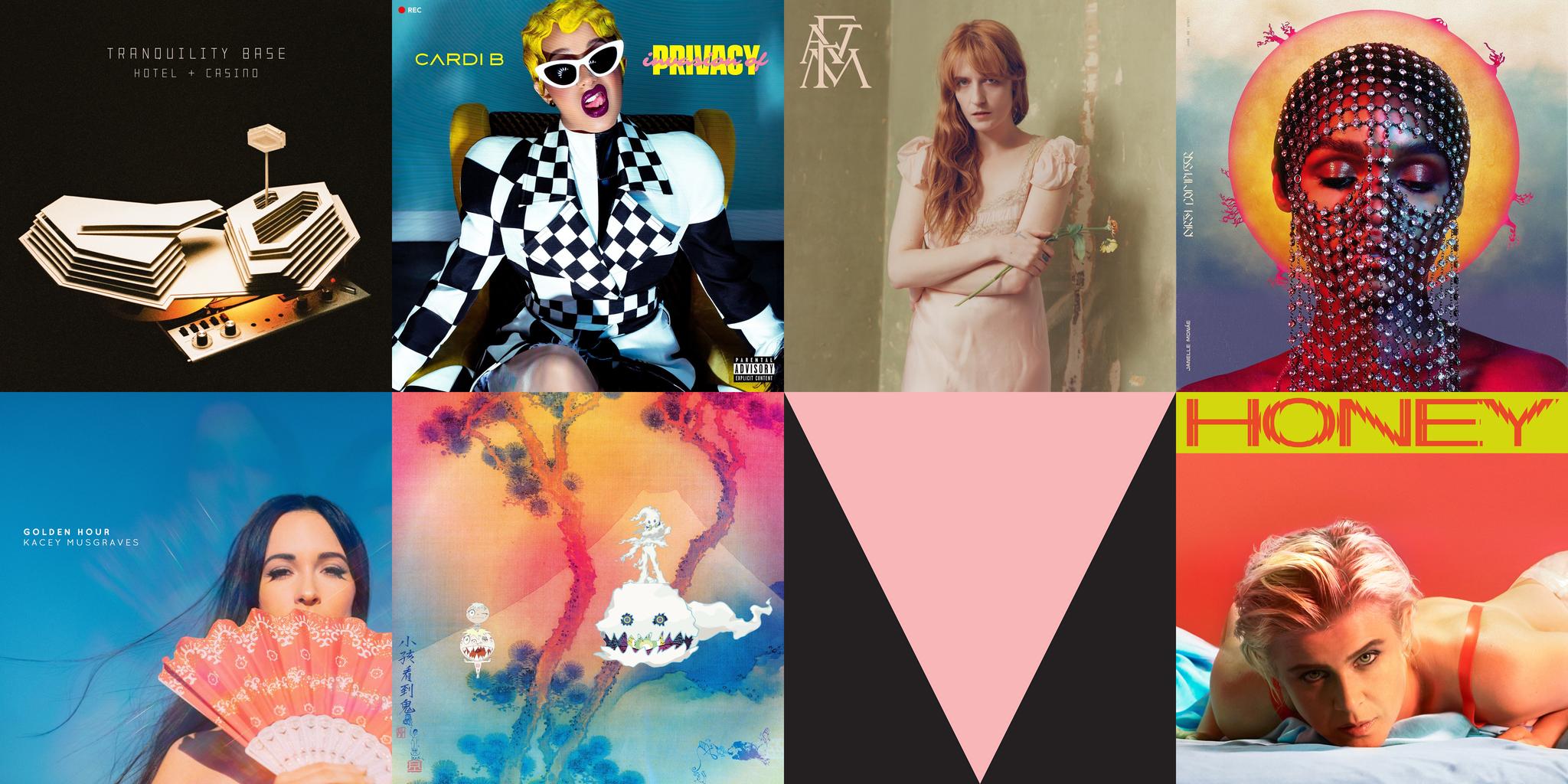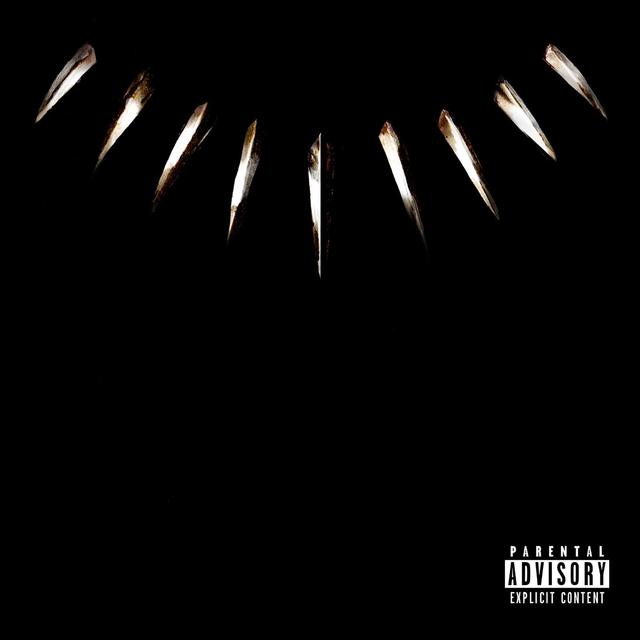
New York Post's Best Albums of 2018
Our top 10 includes chart queens Janelle Monáe, Kacey Musgraves and Cardi B, plus the epic return of Robyn.
Published: December 28, 2018 21:14
Source

In 2016, Alex Turner received a piano for his 30th birthday and started playing seriously for the first time in over 20 years. Songs for Arctic Monkeys’ sixth album eventually emerged—a collection of brooding, cosmic lounge-pop that’s typical of the band only in its disdain for playing it safe. Here, light-years from their previous riff-driven adventures, melodies unspool slowly but stick faster with every listen. A watering hole on the moon provides the conceptual framework for Turner to muse on life, pop culture, and technology with heavy-lidded introspection. “I need to spend less time stood around in bars/Waffling on to strangers about martial arts,” he sighs on “She Looks Like Fun.” He shouldn’t be hasty: Wherever he finds inspiration, it takes his band to daring new places.

Cardi B’s “Bodak Yellow,” the most chantable song of 2017, introduced the Bronx MC’s lively around-the-way-girl persona to the world. Her debut album, *Invasion of Privacy*, reveals more of Cardi\'s layers, the MC leaning forcefully into her many influences. “I Like It,” featuring Bad Bunny and J Balvin, is a nod to her Afro-Caribbean roots, while “Bickenhead” reimagines Project Pat’s battle-of-the-sexes classic “Chickenhead” as a hustler’s anthem. There are lyrical winks at NYC culture (“Flexing on b\*tches as hard as I can/Eating halal, driving a Lam”), but Cardi also hits on universal moments, like going back and forth with a lover (“Ring”) and reckoning with infidelity (“Thru Your Phone”).

“Before, I thought I ran on a chaos engine,” Florence Welch told the *Guardian* in June 2018, shortly ahead of the release of *High as Hope*. “But the more peaceful I am, the more I can give to the work. I can address things I wasn’t capable of doing before.” This newfound openness gives her band’s fourth LP an unvarnished vulnerability. “Hunger” will sit proudly among her most personal and beautiful songs, while “South London Forever” and “Grace” both make peace with the excesses that decorated her rise to fame. Such lyrical heft affords the Londoners a chance to explore a more delicate, restrained sound, but there’s still space for Welch to blow the roof off. A fiery confessional that majestically takes to the skies and forms the album’s centerpiece, “100 Years” uncorks some vintage Florence. No one, we’re reminded, chronicles sadness quite so exquisitely, or explosively.

After two concept albums and a string of roles in Hollywood blockbusters, one of music’s fiercest visionaries sheds her alter egos and steps out as herself. Buckle up: Human Monáe wields twice the power of any sci-fi character. In this confessional, far-reaching triumph, she dreams of a world in which love wins (“Pynk\") and women of color have agency (“Django Jane”). Featuring guest appearances from Brian Wilson, Grimes, and Pharrell—and bearing the clear influence of Prince, Monae’s late mentor—*Dirty Computer* is as uncompromising and mighty as it is graceful and fun. “I’m the venom and the antidote,” she wails in “I Like That,” a song about embracing these very contradictions. “Take a different type of girl to keep the whole world afloat.”

*“Excited for you to sit back and experience *Golden Hour* in a whole new, sonically revolutionized way,” Kacey Musgraves tells Apple Music. “You’re going to hear how I wanted you to hear it in my head. Every layer. Every nuance. Surrounding you.”* Since emerging in 2013 as a slyly progressive lyricist, Kacey Musgraves has slipped radical ideas into traditional arrangements palatable enough for Nashville\'s old guard and prudently changed country music\'s narrative. On *Golden Hour*, she continues to broaden the genre\'s horizons by deftly incorporating unfamiliar sounds—Bee Gees-inspired disco flourish (“High Horse”), pulsating drums, and synth-pop shimmer (“Velvet Elvis”)—into songs that could still shine on country radio. Those details are taken to a whole new level in Spatial Audio with Dolby Atmos. Most endearing, perhaps, is “Oh, What a World,” her free-spirited ode to the magic of humankind that was written in the glow of an acid trip. It’s all so graceful and low-key that even the toughest country purists will find themselves swaying along.

If *ye*, Kanye West’s solo album released one week prior, was him proudly shouting about his superpower—bipolar disorder—from the peak of a snowcapped mountain, *KIDS SEE GHOSTS* is the fireside therapy session occurring at its base. Both Kid Cudi and West have dealt with controversy and mental illness throughout their intertwined careers. It’s all addressed here, on their long-awaited first joint album, with honesty and innate chemistry. Kanye’s production pulsates and rumbles beneath his signature confessional bars and religious affirmations, but, centered by Cudi’s gift for melodic depth and understated humility, his contributions, and the project overall, feel cathartic rather than bombastic and headline-grabbing. On “Freeee (Ghost Town, Pt. 2),” the sequel to *ye* highlight “Ghost Town,” both men bellow, “Nothing hurts me anymore…I feel free” with such tangible, full-bodied energy, it feels as though this very recording was, in itself, a moment of great healing.


If Robyn has found peace or happiness, you wouldn’t necessarily know it by listening to her first album in eight years. Opener “Missing U” sets the mood, with wistful lines about stopped clocks and empty spaces left behind. Yet it’s somehow one of *Honey*’s more upbeat tracks, with an insistent rhythm and glittery arpeggios that recall the brightest moments of 2010’s *Body Talk*. At its best, Robyn’s music has always straddled the line between club-ready dance and melancholy pop, and her strongest singles to date, “Dancing On My Own” and “Be Mine!,” strike this balance perfectly. But never before have we heard the kind of emotional intensity that possesses *Honey*; in the years leading up to it, Robyn suffered through the 2014 death of longtime collaborator Christian Falk and a breakup with her partner Max Vitali (though they’ve since reunited). A few one-off projects aside, she mostly withdrew from music and public life, so *Honey* is a comeback in more ways than one. Produced with a handful of collaborators, like Kindness’ Adam Bainbridge and Metronomy’s Joseph Mount, the album mostly abandons the disco of \"Missing U,\" opting to pair Robyn’s darker lyrics with more understated, house-influenced textures. She gives in to nostalgia on “Because It’s in the Music” (“They wrote a song about us...Even though it kills me, I still play it anyway”) and gets existential on “Human Being” (“Don’t shut me out, you know we’re the same kind, a dying race”). But for all the urgent and relatable rawness, *Honey* is not all doom and gloom: By the time closer “Ever Again” rolls around, she’s on the upswing, and there’s a glimmer of a possible happy ending. “I swear I’m never gonna be brokenhearted ever again,” she sings, as if to convince herself. “I’m only gonna sing about love ever again.”

“My natural go-to is sad songs”, Troye Sivan tells Apple Music. But the South African-born, Australian-raised, LA-residing pop star found himself with a problem when he started work on his second album. “I’d go into the studio and think, ‘What am I sad about?’ And it just wasn’t there. So I started writing these lighter, happier songs.” That has manifested as *Bloom*, a warm, upbeat record about love, sex, relationships, and self-discovery. “My My My!,” “Bloom,” and “Dance to This (feat. Ariana Grande)” are ecstatic, innuendo-laden dance-pop hits that glow with the brightness of flourishing love. Even the more solemn songs about difficult moments and breaking up are wise and wistful, rather than melancholy. On “The Good Side,” he gently sings to his ex-boyfriend over an acoustic guitar: “I sympathize, and I recognize/And baby, I apologize/That I got the good side of things.” *Bloom* is, above all else, an ode to the joys of nascent maturity. “I’m out of the teen angst now,” he says. “I’m 23 and I feel a little bit more that I know who I am. I’m super in love. I wanted to immortalize that, as much for myself as anyone else.” Beyond the album’s more dynamic sound—which he says he designed for “hopping around the stage”—what really makes *Bloom* so special is the intimacy behind it all. “Music has always been extremely personal and extremely cathartic and therapeutic,” says Sivan, citing Amy Winehouse as an example of using specificity to make songs more relatable. “That’s the most powerful way to speak to an audience: to just be real with them.”
